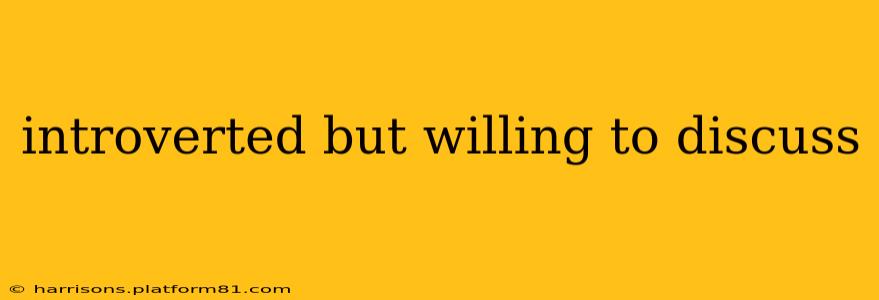Introverted but Willing to Discuss: Understanding and Navigating This Paradox
Many people see introversion as a barrier to communication, a sign of shyness or social awkwardness. However, being introverted doesn't mean you're unwilling to talk; it simply means you gain energy from solitude and may require more mental preparation before engaging in social interactions. This article explores the nuances of being introverted yet willing to discuss, addressing common misconceptions and offering insights into effective communication strategies.
What does it mean to be introverted but willing to discuss?
This seemingly paradoxical phrase describes individuals who, despite preferring solitary activities and needing time to recharge after social events, are perfectly capable and often eager to engage in meaningful conversations. They may choose their interactions carefully, preferring deep, thoughtful discussions with a select few over superficial small talk with many. Their willingness to discuss stems from a genuine interest in the topic or the person, not a need for constant social stimulation.
H2: How is this different from being shy or socially anxious?
Introversion and shyness are often conflated, but they are distinct concepts. Shyness is characterized by a fear of social judgment and negative evaluation, often leading to avoidance of social situations. Introversion, on the other hand, is a preference for solitary activities and a need for less social stimulation. Someone introverted but willing to discuss might feel perfectly comfortable engaging in a conversation about a subject they're passionate about, even if it's with strangers. Social anxiety, meanwhile, involves intense fear and discomfort in social situations, often accompanied by physical symptoms like sweating or rapid heartbeat. An individual experiencing social anxiety might be unwilling to discuss, even if they are interested in the topic.
H2: What are some common misconceptions about introverts?
A frequent misconception is that introverts are antisocial or unfriendly. This couldn't be further from the truth. Many introverts deeply value their relationships and enjoy meaningful interactions, but they require more time and energy to process those interactions. Another misconception is that introverts dislike people. This is false; they simply need more time alone to recharge their social batteries. Introverts are often excellent listeners and deep thinkers, traits that make them valuable conversational partners once they are comfortable.
H2: How can introverts effectively communicate their willingness to discuss?
For introverts, signaling their openness to conversation requires a subtle approach. Active listening, making eye contact, and offering thoughtful responses demonstrate engagement. Participating in online discussions or forums allows introverts to share their views in a comfortable environment before transitioning to face-to-face conversations. Starting a conversation by asking a thoughtful question about the other person's interests can create a welcoming environment for deeper discussion.
H2: What are some tips for interacting with someone who is introverted but willing to discuss?
Patience and understanding are key. Don't pressure the introvert into prolonged social interaction. Give them space and time to process information and respond. Avoid interrupting and allow for pauses in conversation – this is not a sign of disinterest but rather a natural rhythm for many introverts. Start with open-ended questions that encourage reflection rather than simple yes/no answers. And most importantly, be a good listener! Introverts often appreciate thoughtful engagement more than boisterous conversation.
H2: Is it possible to be both extroverted and introverted?
Yes! Ambiversion describes individuals who exhibit traits of both introversion and extroversion. They may enjoy social interaction, but they also require solitude to recharge. This is a perfectly normal personality type, and many people fall somewhere on the spectrum between pure introversion and pure extroversion.
In conclusion, being introverted but willing to discuss is a perfectly valid personality trait. Understanding this nuanced perspective helps to dispel common misconceptions and fosters more effective communication, both for introverts and those who interact with them. By embracing individual communication styles and fostering patience and understanding, we can create more inclusive and welcoming spaces for everyone to engage in meaningful conversations.
